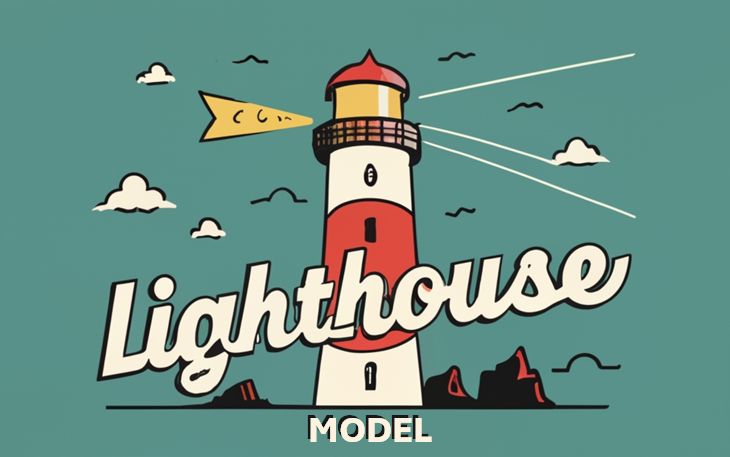In tumultuous times, business leaders need a beacon to guide them towards growth and opportunity.

The old models of top-down authority and rigid adherence to preconceived notions fail in the face of rapid change. Today's disruptive markets require a new mindset—one based on intellectual humility, open learning, and collective insight or what we call the Enterprise Agility Way of Thinking (EAWT). The Lighthouse Model is part of EAWT and provides this systematic framework for empowering innovation.
At its foundation lies intellectual humility—recognizing the inherent limits of one's knowledge. Traditional notions of leadership valorize certainty and having all the answers. Yet exponential growth in information and market complexity mean no one person can expect to have complete mastery. Intellectual humility acknowledges this, creating space for curiosity and exploration of diverse perspectives.
Rather than reacting defensively to challenges to their views, intellectually humble leaders listen attentively. They inquire into how collaborators and customers experience problems differently. Active listening fosters unexpected insights and helps identify issues misdiagnoses may overlook.
Letting go of preconceived notions allows examining challenges through colleagues' diverse values and modes of thinking. This meta-cognitive approach reveals assumptions that constrain solutions. By considering unfamiliar angles, leaders gain a nuanced systems view of the interconnected factors driving business challenges.
Armed with rich insights, leaders can then articulate their vision and bounds for innovation. But this too must be presented with humility, as an evolving framework to guide ideation. People across the organization are invited to co-create solutions that balance stakeholder needs, sustainability, and humanistic ethics.
Barriers to implementing ideas are then honestly investigated rather than avoided. Necessary compromises, skill building, and conflict resolution receive priority. Without recklessly rushing ahead, promising options are pursued based on collective wisdom.
Finally, leaders maintain readiness to continuously re-examine directions as markets shift. Solutions have short half-lives today. The Lighthouse Model develops an agile, lifelong learning mindset needed to regularly recalibrate understanding.
The Lighthouse Model catalyzes innovation by dismantling siloed thinking and hierarchy. Intellectual humility allows collective insight to flourish across organizations. As leaders let go of hubris, they gain flexibility and connection to their teams’ creativity. A spirit of open collaboration and mutual trust empowers people to reimagine solutions without fear of judgment.
The business benefits are immense. Research shows intellectually humble leaders are seen as more effective and dedicated to their teams’ growth and welbeing. Their participatory innovation increases buy-in and speeds implementation. By fully exploring the problem space, they arrive at customer-centric solutions that create shared value.
In turbulent times, the Lighthouse model and the Fish model help leaders navigate confidently by consistently challenging old assumptions. Intellectual humility allows collectively building on diverse perspectives and emerging opportunities. With this light guiding the way, companies can rapidly co-create innovations that propel them into the future.
